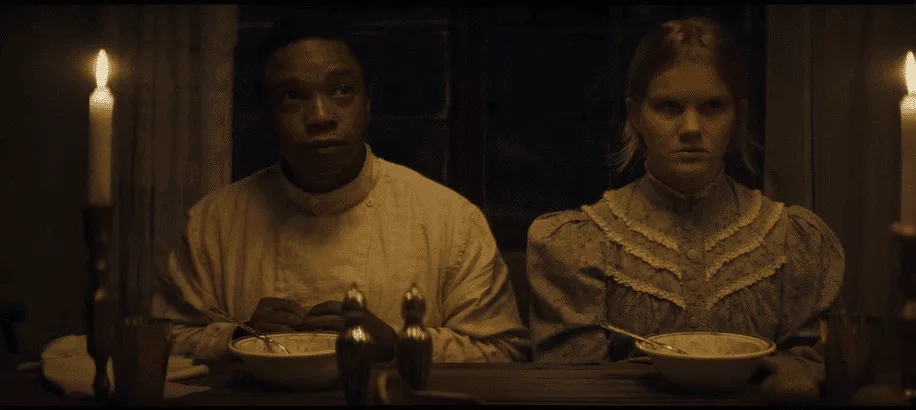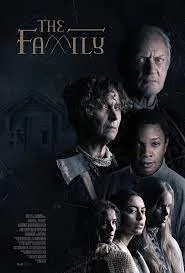
Toil – in the Biblical sense – sets us going on the very first scenes in The Family. This is an immediately bleak, dirt-encrusted tale of life inside an insular and grimly religious household, with an undisputed – and cruel – patriarch presiding over the children’s labours. ‘Father’ (Nigel Bennett) is not averse to smothering his wayward offspring in mud, if they can’t or won’t work any more. The dour intensity here is, then, immediate. But is Father paranoid, or simply vigilant? He presses for the isolation of his family to continue, but he stresses that it is vital; at prayer, and at chapel, the family are apparently aware of an ‘interloper’, mentioned by name as Abaddon, who wants nothing more than to steal these people’s souls. Son Caleb (Benjamin Charles Watson) is on the verge of adulthood, to be recognised as a man hereafter – but this doesn’t grant him more power, but seemingly less, as he struggles to understand what his new role actually means. The drive to ‘keep out the darkness’ seems to become even more urgent.
Fundamentalist religions and cults, like this one, have long been selling passes to a very selective afterlife and purporting to stave off cunning spiritual foes; the question here is what really exists on the outskirts of the compound. As Caleb checks the animals traps one evening, he crosses the threshold into the ‘forbidden’ outside and hears a sound. It sounds like a woman, singing, and he finds a mysterious dwelling a little way off, too. Frightened, he retreats, and it seems for good reason: his transgression is punishable, his sin of crossing the sacred threshold held up as a great danger for everyone else. Again, if this is purely down to Father’s rod of iron approach, it’s notable that not long afterwards, the peace – such as it is – gets disturbed. This is deemed all part of Eitan’s plan – Eitan being the version of God the family worships. A further change in the family dynamic is around the corner, and a new arrival complicates dynamics and statuses. For Caleb, faithful but unaware of Eitan’s grand schemes, his suffering will become the crux of the action.

Several other films have tackled this idea of the isolated family unit and how faith can present horrors of its own, but The Family does so excellently. The escalating strangeness is handled carefully and quietly, with subtle but innovative developments and surprises, even if you might be tempted to guess at where things are going (this reviewer never felt quite confident enough for that; the nature of the family is such that certainties are in short supply). For such a mood piece, the tone and pace work well together. The film is chaptered – into…seven parts? This is de rigeur, but as usual this particular lofty tic doesn’t add a great deal, feeling unnecessary given the skilled ways in which the narrative is moved on by words and deeds in the script.
One of the ways in which the film succeeds is via its excellent performances. Benjamin Charles Watson as Caleb gets the majority of the screen time, and he’s certainly equal to it; he is an innocent, always trying to discern the best ways to behave and being stymied by his father’s cruelty. Father, though, is not just a straightforward villain, however sinister he can be. There are odd moments of what look like warmth and concern, or is that a ruse which tricks us, too? No wonder Caleb is disorientated. Able support comes from the other siblings, particularly Abigail (Jenna Warren), who has her own limits; Mother (Toni Ellwand) is seemingly every bit as vicious as Father. A rock solid script with no glaring anachronisms, which I’ve seen in other period films helps cement some excellent casting (The Family looks like a 19th Century conservative Christian family, and they sound like it too).
Be this a 19th Century setting, rather than (say) a 17th Century one, but there are some similarities here to The Witch, a film which is similar aesthetically, with the same period detail, use of natural light and an isolated family farmstead, but The Family is nonetheless no re-tread of the influential earlier film. True, it has a similar feeling of never quite being fully abreast of the mysteries unfolding, and there’s that self-same sense of sexuality, hovering over both stories, but in key respects, The Family has more questions to ask. It’s a mysterious film and feels no lesser a film for alluding to, rather than answering everything.
The Family is a brutal yet thoughtful film, meticulous in its details and impressive in how it marries atmosphere with tension. It’s also a film which shows that in folk horror, it’s often the folk themselves which are the source of the horror. Very impressive.
The Family will screen as part of the Blood in the Snow Film Festival on November 23rd. For more details, please click here.
